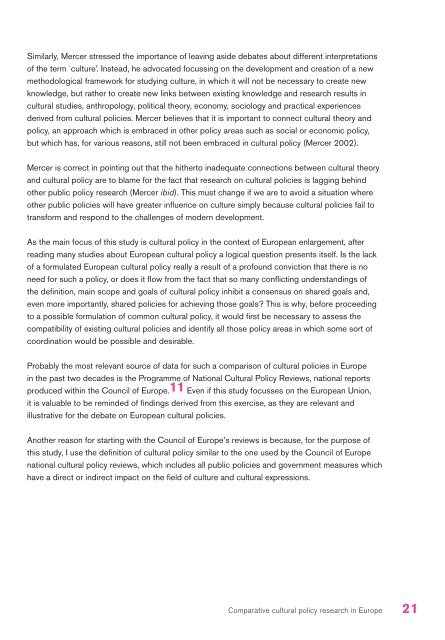Gray called for comparative research <strong>of</strong> <strong>cultural</strong> <strong>policies</strong> to be reformulated in a way which wouldmore resemble <strong>the</strong> analysis <strong>of</strong> o<strong>the</strong>r public <strong>policies</strong>. He suggested possible elements important forpolicy analysis, while asking questions such as, what is <strong>the</strong> subject <strong>of</strong> that analysis and how is <strong>the</strong>subject being analyzed. This approach could be described as an approach demanding continualinteraction bet<strong>we</strong>en <strong>the</strong>ory and administrative practice.If <strong>we</strong> look at <strong>the</strong> matrix proposed by Gray and try to apply <strong>the</strong> first approach to our topic <strong>of</strong> interestor to look at <strong>the</strong> possible <strong>impact</strong> <strong>of</strong> <strong>EU</strong> enlargement on <strong>cultural</strong> <strong>policies</strong> in transition countries,numerous obstacles immediately crop up. The first one is <strong>the</strong> lack <strong>of</strong> definition <strong>of</strong> a <strong>cultural</strong> policy<strong>of</strong> <strong>the</strong> <strong>European</strong> Union. Because <strong>of</strong> this, it is impossible ei<strong>the</strong>r to define a `choice <strong>of</strong> scope’,or to draw a line bet<strong>we</strong>en not only public and private responsibility, but also bet<strong>we</strong>en nationalresponsibility in <strong>the</strong> field <strong>of</strong> culture and handing such responsibilities up to a higher `umbrella’body, such as <strong>the</strong> <strong>EU</strong>. This is an issue which will occur again in this study.Ho<strong>we</strong>ver, <strong>the</strong> second approach, <strong>the</strong> definition <strong>of</strong> structures and instruments used in creatingpublic <strong>policies</strong>, could serve as a good starting point. If <strong>we</strong> start by analyzing <strong>cultural</strong> <strong>policies</strong> at<strong>the</strong> national level, <strong>the</strong>n look at different structures and instruments on <strong>the</strong> <strong>European</strong> level relevantfor what <strong>we</strong> consider to be <strong>the</strong> scope <strong>of</strong> <strong>cultural</strong> <strong>policies</strong> nationally, <strong>we</strong> discover – perhapsunexpectedly – numerous laws that significantly affect culture but are not explicitly ordered within<strong>the</strong> <strong>EU</strong>’s restrictively envisioned <strong>policies</strong> on culture.The third approach, which highlights <strong>the</strong> fact that <strong>cultural</strong> policy is a shifting, even volatilephenomenon, subject to different influences, illustrates <strong>the</strong> complexity that <strong>we</strong> <strong>need</strong> to deal withas <strong>we</strong> navigate <strong>the</strong> labyrinth <strong>of</strong> conflicting understandings and interpretations <strong>of</strong> <strong>the</strong> role <strong>of</strong> culturein <strong>the</strong> <strong>European</strong> Union.In o<strong>the</strong>r words, <strong>the</strong> main challenge remains:■ how to define our field <strong>of</strong> study■ how to identify which instruments to consider as an integral part <strong>of</strong> <strong>European</strong><strong>cultural</strong> policyor■ how to identify which factors are relevant for culture in <strong>the</strong> broader enlargementpolicy agenda.Culture: a lack <strong>of</strong> <strong>the</strong>ory?A number <strong>of</strong> authors have explored possible definitions <strong>of</strong> culture. Notably Bennett, forexample, who calls for culture to be regarded primarily as an area <strong>of</strong> government intervention,akin to health, education and so on, not as a subject for abstract debate (Bennett 1992). Heargued for a restrictive definition <strong>of</strong> culture, which includes a range <strong>of</strong> `institutionally conceivedprocesses’ which in turn form <strong>the</strong> main parameters <strong>of</strong> action in this area, especially those thatare characteristic <strong>of</strong> contemporary societies. These, even if <strong>the</strong>y are not exclusively within agovernment’s competence, in some ways are determined by governments (Bennett 1989).20Part 1 The conceptual frame <strong>of</strong> <strong>the</strong> study
Similarly, Mercer stressed <strong>the</strong> importance <strong>of</strong> leaving aside debates about different interpretations<strong>of</strong> <strong>the</strong> term `culture’. Instead, he advocated focussing on <strong>the</strong> development and creation <strong>of</strong> a newmethodological framework for studying culture, in which it will not be necessary to create newknowledge, but ra<strong>the</strong>r to create new links bet<strong>we</strong>en existing knowledge and research results in<strong>cultural</strong> studies, anthropology, political <strong>the</strong>ory, economy, sociology and practical experiencesderived from <strong>cultural</strong> <strong>policies</strong>. Mercer believes that it is important to connect <strong>cultural</strong> <strong>the</strong>ory andpolicy, an approach which is embraced in o<strong>the</strong>r policy areas such as social or economic policy,but which has, for various reasons, still not been embraced in <strong>cultural</strong> policy (Mercer 2002).Mercer is correct in pointing out that <strong>the</strong> hi<strong>the</strong>rto inadequate connections bet<strong>we</strong>en <strong>cultural</strong> <strong>the</strong>oryand <strong>cultural</strong> policy are to blame for <strong>the</strong> fact that research on <strong>cultural</strong> <strong>policies</strong> is lagging behindo<strong>the</strong>r public policy research (Mercer ibid). This must change if <strong>we</strong> are to avoid a situation whereo<strong>the</strong>r public <strong>policies</strong> will have greater influence on culture simply because <strong>cultural</strong> <strong>policies</strong> fail totransform and respond to <strong>the</strong> challenges <strong>of</strong> modern development.As <strong>the</strong> main focus <strong>of</strong> this study is <strong>cultural</strong> policy in <strong>the</strong> context <strong>of</strong> <strong>European</strong> enlargement, afterreading many studies about <strong>European</strong> <strong>cultural</strong> policy a logical question presents itself. Is <strong>the</strong> lack<strong>of</strong> a formulated <strong>European</strong> <strong>cultural</strong> policy really a result <strong>of</strong> a pr<strong>of</strong>ound conviction that <strong>the</strong>re is no<strong>need</strong> for such a policy, or does it flow from <strong>the</strong> fact that so many conflicting understandings <strong>of</strong><strong>the</strong> definition, main scope and goals <strong>of</strong> <strong>cultural</strong> policy inhibit a consensus on shared goals and,even more importantly, shared <strong>policies</strong> for achieving those goals? This is why, before proceedingto a possible formulation <strong>of</strong> common <strong>cultural</strong> policy, it would first be necessary to assess <strong>the</strong>compatibility <strong>of</strong> existing <strong>cultural</strong> <strong>policies</strong> and identify all those policy areas in which some sort <strong>of</strong>coordination would be possible and desirable.Probably <strong>the</strong> most relevant source <strong>of</strong> data for such a comparison <strong>of</strong> <strong>cultural</strong> <strong>policies</strong> in Europein <strong>the</strong> past two decades is <strong>the</strong> Programme <strong>of</strong> National Cultural Policy Reviews, national reportsproduced within <strong>the</strong> Council <strong>of</strong> Europe.11 Even if this study focusses on <strong>the</strong> <strong>European</strong> Union,it is valuable to be reminded <strong>of</strong> findings derived from this exercise, as <strong>the</strong>y are relevant andillustrative for <strong>the</strong> debate on <strong>European</strong> <strong>cultural</strong> <strong>policies</strong>.Ano<strong>the</strong>r reason for starting with <strong>the</strong> Council <strong>of</strong> Europe’s reviews is because, for <strong>the</strong> purpose <strong>of</strong>this study, I use <strong>the</strong> definition <strong>of</strong> <strong>cultural</strong> policy similar to <strong>the</strong> one used by <strong>the</strong> Council <strong>of</strong> Europenational <strong>cultural</strong> policy reviews, which includes all public <strong>policies</strong> and government measures whichhave a direct or indirect <strong>impact</strong> on <strong>the</strong> field <strong>of</strong> culture and <strong>cultural</strong> expressions.Comparative <strong>cultural</strong> policy research in Europe21
- Page 1 and 2: Why we need European cultural polic
- Page 3: 06081116171822252829313737404343454
- Page 6 and 7: Prologue When I decided to research
- Page 8 and 9: If I had the opportunity of startin
- Page 10 and 11: Measures directly referring to cult
- Page 12 and 13: obstacles encountered during the pe
- Page 14 and 15: Part 1Theconceptualframe ofthe stud
- Page 16 and 17: argument referred to identifying ex
- Page 20 and 21: The Council of Europe and comparati
- Page 22 and 23: a broader understanding of culture,
- Page 24 and 25: The first one is a `macro’ dimens
- Page 26 and 27: Part 2European Union,culture andcul
- Page 28 and 29: narrow sense - still remains exclud
- Page 30 and 31: Niedobitek (see page 29) drew atten
- Page 32 and 33: Even though the author thought that
- Page 34 and 35: In spring 2005 two founding members
- Page 36 and 37: I am focussing more on the technica
- Page 38 and 39: while enlargement negotiations were
- Page 40 and 41: ights.56 Since the mid-1990s, the E
- Page 42 and 43: This included information about Cha
- Page 44 and 45: Gradual development and introductio
- Page 46 and 47: of the background presented earlier
- Page 48 and 49: `Eventually, a solution was found,
- Page 50 and 51: In regard to other taxes, opinions
- Page 52 and 53: meet the recently introduced regula
- Page 54 and 55: introduces the possibility of makin
- Page 56 and 57: One of the recommendations in the F
- Page 58 and 59: IPR legislation into line with Worl
- Page 60 and 61: Preliminary assessmentof the impact
- Page 62 and 63: Changes in taxation policies were n
- Page 64 and 65: policy areas and the ensuing transf
- Page 66 and 67: Part 3What willthe futurebring?68 P
- Page 68 and 69:
Manuel Barroso, President of the Eu
- Page 70 and 71:
has been embraced by the European m
- Page 73 and 74:
Instead of a conclusionThe aim of t
- Page 75 and 76:
1 The French term acquis communauta
- Page 77 and 78:
14 When deciding on the methodology
- Page 79 and 80:
30 OJ C 336, 19/12/1992.31 1st Repo
- Page 81 and 82:
45 After the signing and entry into
- Page 83 and 84:
65 See Annex 1 for a copy of theque
- Page 85 and 86:
81 32001G0731(01) Council Resolutio
- Page 87 and 88:
culture, which needs to be exempt f
- Page 89 and 90:
Aubry P, (2000)The `Television with
- Page 91 and 92:
Draus F, (2001)`Est-Ouest, le dit e
- Page 93 and 94:
Futo P, Cuculić J, et al (2002)Met
- Page 95 and 96:
Laher L, (2001)Trapped in the notio
- Page 97 and 98:
Puchala D J, (1971)`Of blind men, e
- Page 99 and 100:
Weidenfeld W, Wessels W, (1997)Euro
- Page 101 and 102:
2. In your opinion, have the cultur
- Page 103 and 104:
13. Have there been any changes in
- Page 105 and 106:
Annex 3List of CPRA jury membersMil
- Page 107 and 108:
Political Economy Cultural Economic
- Page 109 and 110:
Annex 4GlossaryAcquis communautaire
- Page 111 and 112:
Cultural marketsA term used to desc
- Page 113 and 114:
Third countriesEU documents sometim
- Page 115:
Author: Nina ObuljenEditor: Janet H














